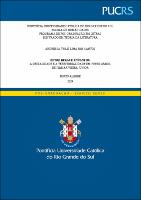| Share record |


|
Please use this identifier to cite or link to this item:
https://tede2.pucrs.br/tede2/handle/tede/11553Full metadata record
| DC Field | Value | Language |
|---|---|---|
| dc.creator | Santos, Andressa Thais Lima dos | - |
| dc.creator.Lattes | http://lattes.cnpq.br/0422799447073606 | por |
| dc.contributor.advisor1 | Barbarena, Ricardo Araújo | - |
| dc.contributor.advisor1Lattes | http://lattes.cnpq.br/4713324061573064 | por |
| dc.contributor.advisor-co1 | Polesso, Natália Borges | - |
| dc.contributor.advisor-co1Lattes | http://lattes.cnpq.br/2332633259643911 | por |
| dc.date.accessioned | 2025-04-24T12:53:40Z | - |
| dc.date.issued | 2024-09-30 | - |
| dc.identifier.uri | https://tede2.pucrs.br/tede2/handle/tede/11553 | - |
| dc.description.resumo | Esta dissertação busca analisar a obra Torto arado (2019), de Itamar Vieira Junior, articulando conceitos da literatura negro-brasileira (Cuti, 2010) com as vivências da negritude construídas na obra, a partir do pensamento nagô (Sodré, 2021), ressaltando a orixalidade (Silveira, 2014) e a territorialidade (Nascimento, 2018). A partir da análise de cinco personagens — Zeca Chapéu Grande, Bibiana, Belonísia, Severo e Santa Rita Pescadeira —, compreendemos a manifestação da orixalidade, relacionando-a com as mitologias das religiões de matriz africana (Prandi, 2017) e estudos sobre os próprios orixás (Kileuy e Oxaguiã, 2009). Simultaneamente, consideramos a importância do cenário em que se desenrola a história, na fictícia Fazenda Água Negra, uma vez que as noções de território são concebidas como lugar de história e memória da população negra e brasileira, transitando entre a senzala, o terreiro e o quilombo. Por meio de uma investigação de caráter analítico e pesquisa bibliográfica, busca-se também identificar como o contexto sócio-histórico e a trajetória social do autor (Velho, 2013) influenciaram o desenvolvimento e a recepção do livro. Torto arado (2019) narra as dores e os amores de uma família quilombola no Recôncavo Baiano, no século XX, destacando a trajetória de pessoas remanescentes de escravizados no período pós-abolição. A obra transcende a narrativa de pessoas remanescentes de escravizados, equiparando as cosmologias às epistemologias e entrelaçando, de forma profunda, memórias e futuro, evidenciando a persistência e a fé da negritude brasileira ao sobreviver e viver na sociedade brasileira. | por |
| dc.description.abstract | This dissertation analyzes the book Crooked plow (2019), by Itamar Vieira Junior, articulating concepts of Black-Brazilian literature (Cuti, 2010) with the experiences of blackness constructed throughout the work, having Nagô Thought as a solid base (Sodré, 2021), emphasizing the Orisha worship (Silveira, 2014) and territoriality (Nascimento, 2018). Upon the analysis of five characters — Zeca Chapéu Grande, Bibiana, Belonísia, Severo and Santa Rita Pescadeira —, we have a clearly understanding the manifestation of Yoruban Orisha worship, relating it to the mythologies of African-based religions (Prandi, 2017) and studies on the Orishas themselves (Kileuy and Oxaguiã, 2009). Simultaneously, we have taken in consideration the importance of the scenario in which the story unfolds, in the fictional Fazenda Água Negra, since the notions of territory are conceived as a place of history and memory of the black and Brazilian population, moving between the slave quarters, the terreiro (Afro-Brazilian religious ground) and the quilombo (runaway slave community). Through an analytical investigation and bibliographical research, we also seek to identify how the author's socio-historical context and social trajectory (Velho, 2013) influenced the development and reception of the book. Crooked plow (2019) narrates the pain and love of a quilombola family in Recôncavo Baiano, in the 20th century, highlighting the trajectory of people who remained as slaves in the post-abolition period. The work transcends the narrative of remaining enslaved people, equating cosmologies with epistemologies and intertwining, in a profound way, memories and the future, emphasizing the persistence and faith of Brazilian blackness in surviving and living in Brazilian society. | eng |
| dc.description.provenance | Submitted by PPG Letras ([email protected]) on 2025-04-07T20:20:33Z No. of bitstreams: 1 DISSERTAÇÃO VERSÃO FINAL (1).pdf: 1241660 bytes, checksum: aeb9a9f0c2fac365bdf5553dee2cea50 (MD5) | eng |
| dc.description.provenance | Approved for entry into archive by Sheila Dias ([email protected]) on 2025-04-24T12:43:53Z (GMT) No. of bitstreams: 1 DISSERTAÇÃO VERSÃO FINAL (1).pdf: 1241660 bytes, checksum: aeb9a9f0c2fac365bdf5553dee2cea50 (MD5) | eng |
| dc.description.provenance | Made available in DSpace on 2025-04-24T12:53:40Z (GMT). No. of bitstreams: 1 DISSERTAÇÃO VERSÃO FINAL (1).pdf: 1241660 bytes, checksum: aeb9a9f0c2fac365bdf5553dee2cea50 (MD5) Previous issue date: 2024-09-30 | eng |
| dc.description.sponsorship | Conselho Nacional de Pesquisa e Desenvolvimento Científico e Tecnológico - CNPq | por |
| dc.format | application/pdf | * |
| dc.thumbnail.url | https://tede2.pucrs.br/tede2/retrieve/193157/DISSERTA%c3%87%c3%83O%20VERS%c3%83O%20FINAL%20%281%29.pdf.jpg | * |
| dc.language | por | por |
| dc.publisher | Pontifícia Universidade Católica do Rio Grande do Sul | por |
| dc.publisher.department | Escola de Humanidades | por |
| dc.publisher.country | Brasil | por |
| dc.publisher.initials | PUCRS | por |
| dc.publisher.program | Programa de Pós-Graduação em Letras | por |
| dc.rights | Acesso Aberto | por |
| dc.subject | Literatura Negro-Brasileira | por |
| dc.subject | Orixalidade | por |
| dc.subject | Quilombo | por |
| dc.subject | Territorialidade | por |
| dc.subject | Torto Arado | por |
| dc.subject.cnpq | LINGUISTICA, LETRAS E ARTES::LETRAS | por |
| dc.title | Entre rezas e encantos : a orixalidade e a territorialidade em Torto Arado, de Itamar Vieira Junior | por |
| dc.type | Dissertação | por |
| dc.restricao.situacao | Trabalho não apresenta restrição para publicação | por |
| Appears in Collections: | Programa de Pós-Graduação em Letras | |
Files in This Item:
| File | Description | Size | Format | |
|---|---|---|---|---|
| DISSERTAÇÃO VERSÃO FINAL (1).pdf | ANDRESSA_THAIS_LIMA_DOS_SANTOS_DIS | 1.21 MB | Adobe PDF |  Download/Open Preview |
Items in DSpace are protected by copyright, with all rights reserved, unless otherwise indicated.




